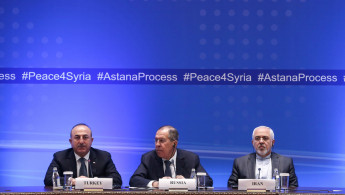Syria talks renew in Astana amid growing regional fears
Negotiators from Iran, Russia and Turkey gathered in Kazakhstan's capital Astana on Monday, hoping to make progress on a political settlement in Syria as diplomatic tensions fan out across the region.
The two-day talks are the first time the three foreign powers most deeply involved in Syria's seven-year war have met together since Iran and Israel became embroiled in a spat over reported cross-border military strikes last week.
It is also the first meeting of the three sides since US President Donald Trump announced Washington's withdrawal from the Iran nuclear deal earlier this month in a move further complicating the regional picture.
A spokesman for Kazakhstan's foreign ministry Anuar Zhainakov on Monday confirmed delegations from the three power-brokers and the Syrian regime had arrived in the capital and were locked in closed-door talks.
But US representatives will not take part in the international meeting in Astana on the settlement in Syria, Zhainakov told reporters on Monday
"The US delegation has refrained from taking part in the current round of talks on Syria in Astana," Zhainakov said.
The United Nations envoy on Syria Staffan de Mistura was also expected in the capital Monday, Zhainakov wrote.
The latest negotiations in Kazakhstan are set to discuss "further steps to advance the process of resolving the crisis" in Syria, according to a Kazakh foreign ministry statement.
The multi-sided conflict that has killed more than 350,000 people took a new turn last week after Israel and Iran became embroiled in a dispute over reported cross-border strikes.
Israel claims it struck dozens of Iranian targets inside Syria Thursday in response to a salvo of rockets fired by Iranian forces into the occupied Golan Heights.
The flare-up between the pair may feature in talks between Iranian foreign minister Mohammad Javad Zarif and Russian counterpart Sergei Lavrov in Moscow Monday.
But the main focus of the Moscow talks will be the Iran nuclear deal Washington walked out of earlier this month, triggering broad international condemnation and fears of fresh conflicts in the region.
Zarif has already visited Beijing and will head to Brussels after Moscow as part of a bid to salvage the deal.
Since negotiations on Syria in Astana began at the beginning of last year, they have mostly focused on attempts to keep Syrian regime forces and their rebel opponents at arm's length.
But any limited achievements in reducing government-rebel hostilities were put into reverse gear in February when regime forces allied with Moscow and Tehran began a devastating assault on Eastern Ghouta, a suburb of Damascus that was under rebel control at the time.
On Friday, Syrian state media and The Syrian Observatory for Human Rights war monitor both said that the last rebel groups had exited towns close to the capital.
Their departure means that militants from the Islamic State group fighting on the outskirts of Damascus are now the main challenge to government control over the capital and its surrounding area.





 Follow the Middle East's top stories in English at The New Arab on Google News
Follow the Middle East's top stories in English at The New Arab on Google News


